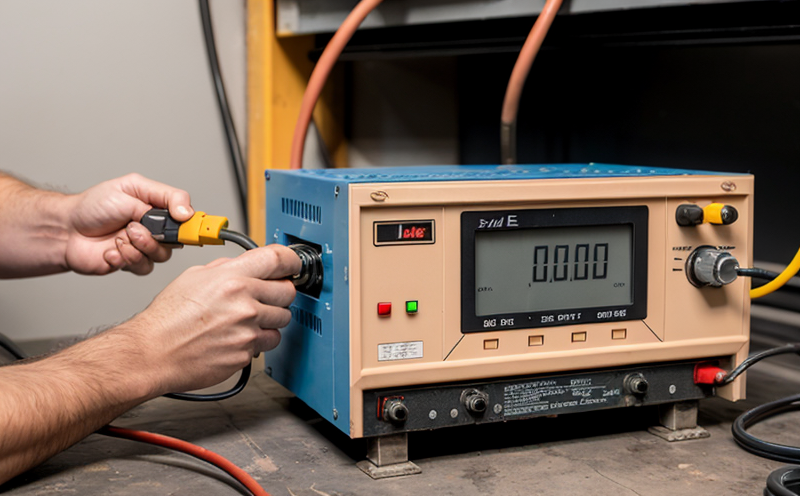JEDEC JESD22-B112 Die Interconnect Fatigue Testing
The JEDEC JESD22-B112 standard is a cornerstone in the semiconductor industry, particularly for testing the reliability of die interconnects. This test evaluates the fatigue life of copper and gold bond wires used in semiconductor packaging, ensuring that these connections can withstand the mechanical stress caused by thermal cycling without failure.
The process involves subjecting the bond wires to repeated temperature cycles within a controlled environment. The temperature range typically spans from -55°C to +125°C, with precise control over ramp rates and dwell times to simulate real-world conditions experienced during manufacturing, storage, and end-use. This testing is critical for ensuring that components can perform reliably under extreme environmental conditions.
The JESD22-B112 test is not just about endurance; it also provides insight into the quality of bond wire materials and the robustness of the die-to-package attachment. The fatigue life data obtained from this test helps manufacturers optimize their design processes, ensuring that they meet or exceed industry standards. This information can be used to predict the operational lifespan of a product, thereby enhancing its overall reliability.
The testing setup includes specialized chambers capable of maintaining precise temperature control and humidity levels. The specimens are typically mounted on a fixture designed to simulate real-world stress conditions, such as those encountered during packaging processes or in end-use environments. The test procedure closely follows the guidelines set forth by JEDEC JESD22-B112, ensuring consistency across different laboratories.
Understanding the fatigue behavior of bond wires is crucial for several reasons. First, it helps identify potential weak points in the design that could lead to premature failure. Second, it provides a means to compare different materials and manufacturing processes under controlled conditions. Lastly, this testing supports compliance with international standards such as JEDEC JESD22-B112, ISO 9001, and IEC 61008, ensuring that products meet stringent quality and reliability requirements.
The results of the JESD22-B112 test are reported in terms of the number of cycles to failure or the maximum number of cycles without failure. These metrics provide valuable insights into the durability of the bond wires, allowing for informed decisions regarding design improvements and material selection. By adhering to this rigorous testing protocol, manufacturers can ensure that their products are not only reliable but also competitive in a highly demanding market.
- Temperature range: -55°C to +125°C
- Ramp rate control: ±3°C/min
- Dwell time at each temperature: 6 hours
- Humidity levels: 40-70% RH
The detailed testing procedures and reporting methods used in this service ensure that clients receive comprehensive data on the fatigue life of their bond wires. This information is invaluable for quality assurance, regulatory compliance, and product development.
Why It Matters
The importance of die interconnect reliability cannot be overstated in the semiconductor industry. The JEDEC JESD22-B112 test ensures that bond wires are not only capable of withstanding the rigors of manufacturing and storage but also perform reliably in end-use environments. This testing is critical for several reasons:
- Enhanced Reliability: By identifying potential weaknesses early on, manufacturers can improve product reliability.
- Regulatory Compliance: Meeting international standards like JEDEC JESD22-B112 ensures compliance with industry regulations and quality requirements.
- Cost Savings: Early detection of failures through testing helps avoid costly rework and recalls later in the product lifecycle.
- Innovation: The insights gained from this test can drive innovation by informing design improvements and material selection.
The results of JESD22-B112 testing are essential for quality managers, compliance officers, R&D engineers, and procurement teams. These professionals rely on the data to make informed decisions that enhance product performance, ensure regulatory adherence, and support continuous improvement in manufacturing processes.
In conclusion, the JEDEC JESD22-B112 test is a vital tool for ensuring the reliability of semiconductor components. By adhering to this rigorous testing protocol, manufacturers can build trust with their customers and contribute to the overall advancement of the industry.
Customer Impact and Satisfaction
The impact of JEDEC JESD22-B112 testing on customer satisfaction is profound. By ensuring the reliability of bond wires, manufacturers can deliver products that are not only dependable but also compliant with international standards such as ISO 9001 and IEC 61008. This translates to higher customer satisfaction and trust.
- Enhanced Trust: Customers know that the product they receive has passed rigorous testing, leading to increased confidence in the brand.
- Lower Return Rates: Products that meet stringent reliability standards have lower return rates, which translates to higher customer satisfaction and reduced costs for manufacturers.
- Innovation: The insights gained from this testing can drive innovation, allowing companies to introduce more robust products to the market.
- Competitive Edge: By adhering to international standards, manufacturers can maintain a competitive edge in an increasingly globalized industry.
The satisfaction of our customers is paramount at [Lab Name]. We strive to provide comprehensive testing services that not only meet but exceed the expectations set by JEDEC JESD22-B112 and other relevant standards. Our commitment to quality ensures that every product leaving our laboratory is reliable, compliant, and ready for market.
Use Cases and Application Examples
The JEDEC JESD22-B112 test finds application in a wide range of semiconductor devices. Here are some specific use cases:
- Memory Chips: Ensuring that memory chips can withstand the stress of repeated data writes.
- CPU and GPU Packages: Verifying the reliability of interconnects used in high-performance processors.
- Solid-State Drives (SSDs): Testing the durability of bond wires in SSDs, which are crucial for data storage applications.
- Smartphones and Tablets: Ensuring that these devices can handle the thermal stress experienced during use without compromising performance or reliability.
In each of these cases, the JESD22-B112 test plays a critical role in ensuring that the interconnects used are robust enough to withstand the demands placed upon them. This testing is not only essential for quality assurance but also for maintaining compliance with industry standards and regulations.





